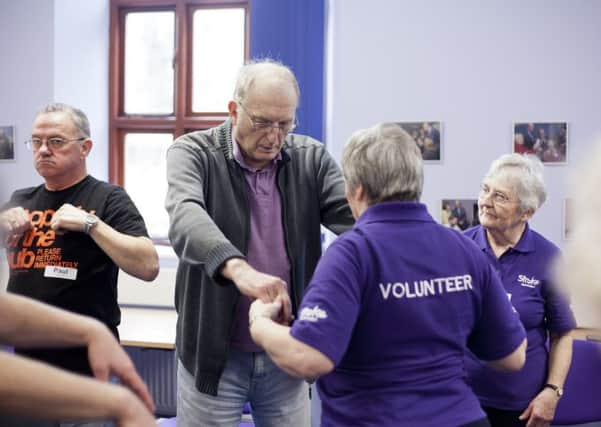Stroke survivors falling through the gaps in care


To mark European Stroke Awareness Day (May 8, 2018) and Make May Purple for Stroke (the UK’s stroke awareness month), the Stroke Association in Scotland is again calling on the Scottish Government to take action around the lack of information relating to the availability and use of stroke rehabilitation services in hospital and the community.
The charity believes that without this information they simply don’t know what support stroke survivors are receiving, especially after discharge from hospital. D
Advertisement
Hide AdAdvertisement
Hide Adiscussions with people who have been affected by stroke suggests they are not getting what they need – which puts their recoveries at risk.
Stroke is the leading cause of disability in the UK affecting mobility, speech, memory, emotions and behaviour. The devastating impact is that many people are unable to go back to work, live in the same house or lead the life they used to.
Rehabilitation helps people get back to independence and regain the everyday abilities and skills they had before their stroke.
Andrea Cail, Director Scotland of the Stroke Association, said: “Rehabilitation support such as physiotherapy, occupational therapy or speech and language therapy can help people affected by stroke to relearn basic skills such as how to walk, talk, wash and dress. After leaving hospital, it’s vital that the rehabilitation is continued to support the journey back to independence.”
Advertisement
Hide AdAdvertisement
Hide AdThe Scottish Government’s Stroke Improvement Plan acknowledges the importance of rehabilitation and support for people after stroke. However, data collection in this area is seriously lacking.
Graeme Clark (42), a father of three children, had a stroke whilst undertaking a triathlon with a friend in June 2015. He was diagnosed with a left-sided brain haemorrhage and was left with physical and communications disabilities.
Graeme said: “It was vital for me to get back to work to care for my wife and children. I feel I didn’t receive enough speech and language therapy as a result of my stroke. It affected my confidence, my relationships and my job prospects. I would have definitely benefited from more support.”
Andrea continued: “It is still the case that not everyone gets the help and support they need and much more still needs to be done. We don’t have the data and information to demonstrate what rehabilitation services are available and where, and who is accessing and for how long. We need this information to understand where the gaps are and drive forward the necessary improvements.
Advertisement
Hide AdAdvertisement
Hide Ad“That’s why we are today calling on the Scottish Government to routinely collect and publish details of the rehabilitation stroke survivors in Scotland receive.”
The Stroke Association provides information and support to anyone who has been affected by stroke via the Stroke Helpline on 0303 3033 100 or by visiting www.stroke.org.uk/independence